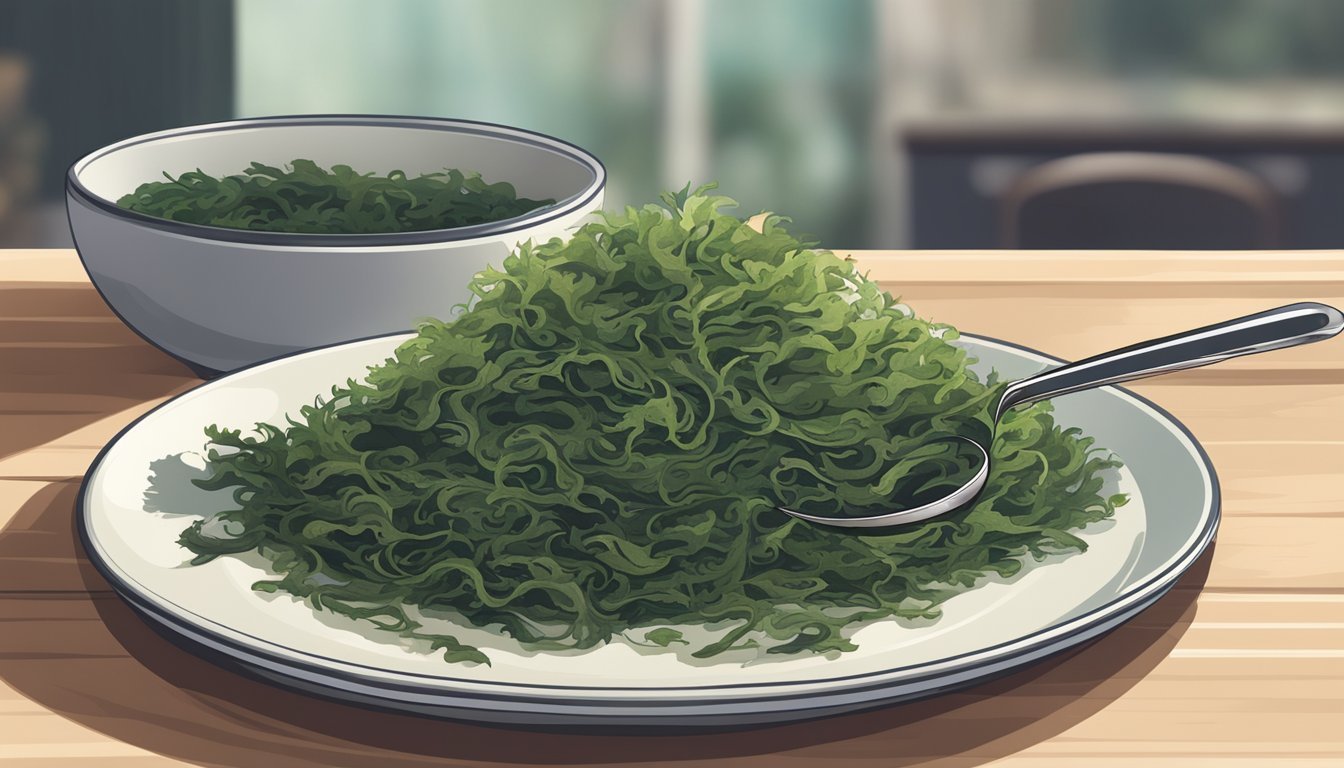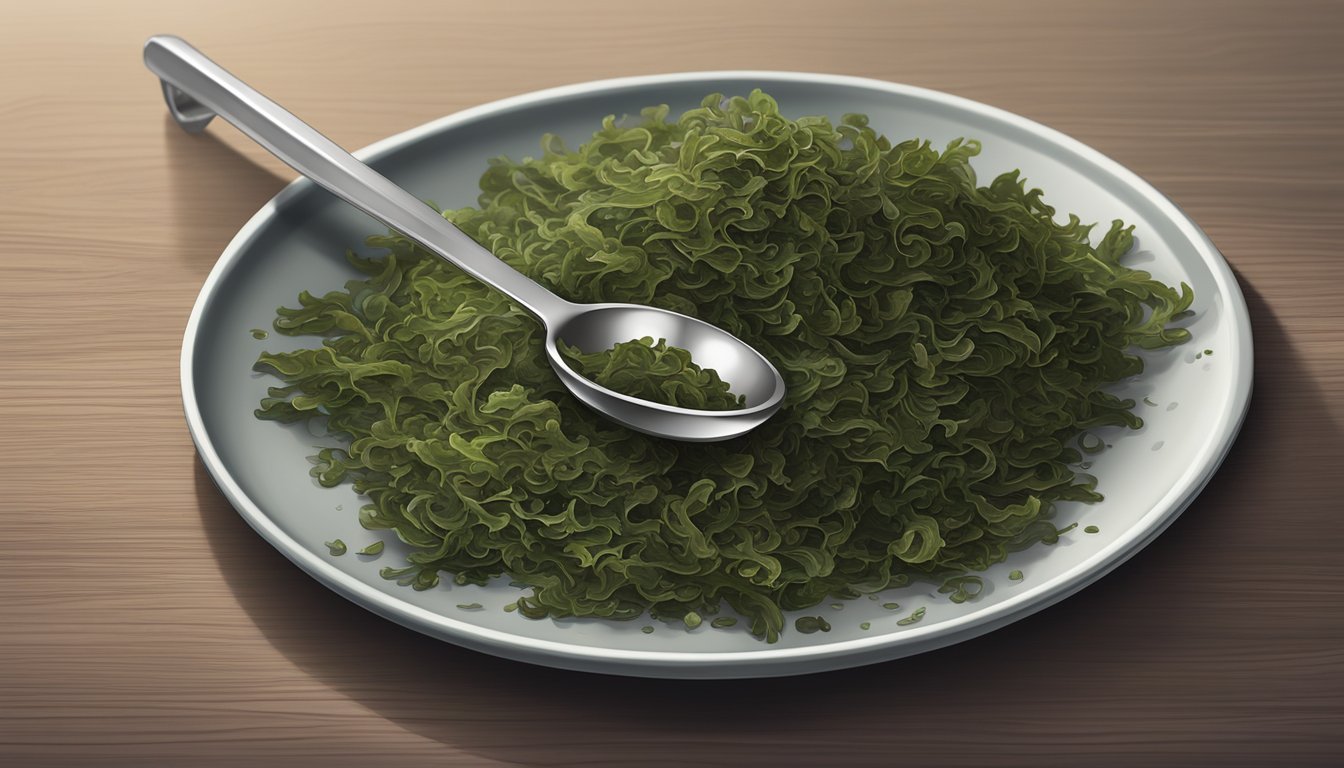How much seaweed should you eat for iodine
Daily Intake Recommendations
Seaweed is heralded as a rich natural source of iodine, an essential trace mineral necessary for maintaining healthy thyroid function. Iodine plays a pivotal role in thyroid hormone production, which in turn regulates metabolism, growth and development. The iodine content in seaweed varies widely among different types; for example, nori, commonly used in sushi, (What wine goes well with sushi?) has a particularly high iodine content. It has been reported that just a 10-gram serving of dried nori seaweed can contain up to 232 micrograms of iodine, which is more than the daily recommended intake for an adult.
However, the consumption of seaweed for iodine needs to be approached with caution. Excessive intake of iodine can have adverse effects on thyroid health, prompting the need for a balanced approach. Eating moderate amounts of seaweed can contribute to iodine sufficiency. For most people, incorporating seaweed into their diet by consuming between 5 to 10 grams per day can be beneficial, providing not only iodine but also fiber and other nutrients.
Despite its benefits, it's crucial for individuals to consider the type of seaweed and its origin, as these factors can influence iodine content and the potential presence of contaminants. Therefore, while seaweed stands out as an excellent dietary source of iodine, consumers should be aware of their personal daily requirements and any specific health considerations that may warrant a tailored intake.
Understanding Iodine and Seaweed
In exploring the consumption of seaweed for iodine intake, it's crucial to understand the role of iodine in the human body and the diverse types of seaweed available. Each type of seaweed has a distinct iodine content, impacting its dietary use.
What Is Iodine?
Iodine is a vital trace mineral essential for the production of thyroid hormones. These hormones regulate various metabolic processes and are crucial for growth and development. The human body does not produce iodine, so it must be sourced from the diet. Edible seaweed is one of the richest natural sources of iodine.
Iodine requirements can vary with age and life stage:
Adults typically require about 150 micrograms (μg) daily.
During pregnancy and lactation, the requirement increases to about 220-290 μg daily.
Excess iodine intake, often exceeding 1,100 μg per day, can lead to thyroid dysfunction, such as hypothyroidism or hyperthyroidism.
Diversity of Seaweed
Seaweed is a term encompassing diverse varieties of marine algae and a few edible species found in fresh water. Some well-known edible seaweeds include:
Nori: Often used in sushi, it is low in iodine compared to other seaweeds, making it a safer option for frequent consumption.
Kombu: High in iodine, this seaweed is typically used in Japanese cuisine to flavor soups and stews.
Wakame: This mild-tasting seaweed is another staple in Japanese diets.
Dulse: Found in the North Atlantic, dulse is a red seaweed with a chewy texture.
Chlorella and Spirulina: Both are types of blue-green algae, often available as dietary supplements.
Arame and Sea Lettuce: Other edible varieties, they are typically used in salads and as garnish.
Brown seaweeds like kombu have higher iodine content compared to red or green seaweeds such as dulse or sea lettuce. It is important to consider this diversity when including seaweed in one's diet for iodine. Eating a variety of seaweeds can help maintain a balanced intake of iodine.
Health Benefits of Seaweed
Seaweed, a marine vegetable, is revered for its dense concentration of vitamins, minerals, and particularly iodine, playing a vital role in thyroid function.
Thyroid Health and Iodine
Iodine is a critical nutrient essential for the production of thyroid hormones, which regulate metabolism. Seaweed is one of the richest natural sources of iodine. Consuming seaweed helps support thyroid health, but it's important to consume it in moderation to avoid iodine levels that are too high, as this can potentially cause thyroid dysfunction.
Nutritional Profile of Seaweed
Seaweed is loaded with a variety of nutrients that contribute to overall health:
Nutrient Benefit Protein Essential for repair and growth of tissues Fiber Aids in digestion and prevents constipation Vitamins A, C, K, and folate support immune system and more Minerals Calcium, magnesium, potassium aid in bone and heart health Iron Crucial for oxygen transport in the blood Fatty acids Omega-3s contribute to brain health
Antioxidants in seaweed help protect the body from oxidative stress, while vitamins and minerals bolster the immune system and promote overall health.
Seaweed and Heart Health
Seaweed's impact on heart health is particularly noteworthy. It contains fatty acids that can help manage cholesterol levels by reducing total cholesterol and LDL, the "bad" cholesterol. Furthermore, the fiber in seaweed can assist in maintaining healthy blood pressure levels, thus supporting a well-functioning cardiovascular system.
Incorporating Seaweed into Your Diet
Seaweed offers a substantial source of dietary iodine essential for thyroid function. It can be easily included in a variety of dishes, from sushi to soups, and is also available as a dietary supplement.
Daily Recommendations for Iodine
The recommended daily intake of iodine is 150 micrograms for the average adult, with pregnant and breastfeeding women needing about 220 to 290 micrograms. Seaweed is a rich source of iodine, and its content varies widely among different types. A daily serving of 4-8 grams of seaweed can help meet these requirements without exceeding the upper limit of 1,100 micrograms.
Seaweed as Food
Seaweed can be incorporated into diets in multiple forms such as fresh or dried. It is popular in Asian cuisines and used in sushi rolls, salads, and stews. A typical seaweed salad may offer both iodine and other nutrients while minimizing excess sodium and sugar. Dried seaweed can be sprinkled on rice or rehydrated for use in soups. It is also a good option for those on a vegan diet, adding a burst of flavor to sea vegetables.
Seaweed Supplements
For individuals preferring not to integrate seaweed directly into their meals, seaweed supplements are available. These dietary supplements provide a controlled iodine intake and are suitable for those who need to monitor their iodine levels carefully. When choosing supplements, one should look for reputable brands that specify the iodine content to avoid deficiency or excess.
Potential Risks and Considerations
When incorporating seaweed into a diet for its iodine content, one must carefully consider potential risks and implications for health. Excessive intake, interactions with certain health conditions, and the presence of harmful substances are crucial factors to be mindful of.
Toxicity and Heavy Metals
Seaweeds, particularly kelp, are known to accumulate heavy metals from their marine environment, including arsenic, mercury, and lead. These elements can pose serious health risks if consumed in large quantities over time. The FDA monitors levels of these metals to ensure they do not exceed safe limits. However, patients should be aware that long-term consumption of seaweed high in heavy metals could potentially increase the risk of cancer and heart disease.
Seaweed and Diabetes Management
Seaweed can influence blood sugar control, which is especially pertinent for individuals with diabetes. Some types of seaweed may have a beneficial effect on blood sugar levels, but this can vary widely depending on the species and the individual's overall diet and diabetes management plan. Therefore, they must be consumed with care, and people with type 2 diabetes should consult healthcare providers to ensure their seaweed intake is compatible with their blood sugar management.
Allergies and Food Sensitivities
Some individuals may experience allergic reactions or food sensitivities to seaweed. This could manifest as gastrointestinal upset, a common side effect when consuming large amounts of seaweed, or even anaphylaxis in severe cases. It is also essential to consider that an iodine deficiency can be dangerous, but too much iodine from excessive seaweed consumption can lead to thyroid imbalances. Individuals must tailor their seaweed intake to their specific dietary needs and consult a healthcare provider if they suspect food sensitivities or an allergy.
Cultural and Environmental Impact
When discussing the ideal consumption of seaweed for iodine intake, it's crucial to consider both cultural preferences and environmental implications.
Seaweed in Asia and Western Diets
In Asia, particularly in countries like Japan, seaweed is a staple food, commonly found in dishes such as sushi. Nori, a type of seaweed, is notable for its use in sushi rolls and as a seasoning. The dietary prominence of seaweed in Asian cultures contrasts with Western countries, where traditionally, seaweed has been less of a dietary component. However, there is an increasing incorporation of sea vegetables into Western diets, often as an organic superfood, signaling a shift in cultural eating habits and recognition of seaweed's nutritional benefits.
Sustainability of Seaweed Farming
Seaweed farming presents a sustainable agricultural practice with a low ecological footprint. It requires no fertilizer, freshwater, or land, making it an environmentally friendly alternative to land-based crops. Sustainability efforts ensure that seaweed farming doesn't deplete natural resources, maintaining balance within the marine ecosystem. The cultivation of seaweed, particularly in Asia, not only supports dietary needs but also plays a role in the economies of many Asian countries, contributing to their organic produce market. As Western interest grows, sustainable practices in seaweed farming are pivotal to meet this demand without compromising the health of marine environments.
Seaweed Beyond Nutrition
Seaweed offers remarkable benefits extending into the realms of skincare and healthcare, as well as finding important applications in various industrial sectors.
Seaweed in Skincare and Healthcare
Algae and seaweed are treasure troves of bioactive compounds, including potent antioxidants. They play a vital role in skin care products aimed at combating signs of aging and oxidative stress. Seaweed extracts are incorporated into creams and serums to help reduce the appearance of wrinkles, while their anti-inflammatory properties can soothe skin stress. In healthcare, seaweed-derived ingredients are found in supplements to support immune function and reduce fatigue.
Industrial Uses of Seaweed
Seaweed is not just edible; it's a versatile substance in industrial applications. Its carbohydrate content makes it an excellent agent for thickening and stabilizing products. Industrially, it helps in the production of crispy coatings and lends the umami flavor to various food products. Beyond the culinary world, seaweed carbohydrates serve in manufacturing biodegradable plastics, contributing to weight loss efforts in the packaging industry.
Conclusion
Seaweed is a rich natural source of iodine, an essential mineral for thyroid function. Including seaweed in one's diet potentially offers several health benefits, such as supporting heart and gut health. However, due to its high iodine content, the quantity of seaweed consumed should be moderated.
Recommendations suggest that the average daily intake of iodine should not exceed 150 micrograms for adults. This equates to a small amount of seaweed, given its iodine density. Specific seaweeds like nori may contain less iodine, while types like kombu have higher concentrations. Therefore, it's sensible for consumers to vary which seaweeds they eat and how often.
The nutritional value of seaweed extends beyond iodine, with inclusion of vitamins, minerals, and fiber. Yet, consumers should be aware of the risks associated with overconsumption. Excessive iodine can lead to thyroid imbalance, and certain seaweeds may absorb heavy metals from their marine environment.
A balanced approach is key. For individuals with existing thyroid issues or on a controlled diet, consulting a healthcare professional before incorporating substantial amounts of seaweed is advisable. For the general population, small, regular servings of seaweed can be part of a nutritious diet, contributing to overall health without overstepping recommended iodine levels.
In summary, mindful consumption of seaweed is recommended, understanding the balance between its nutritional benefits and the necessity to avoid excessive iodine intake.





